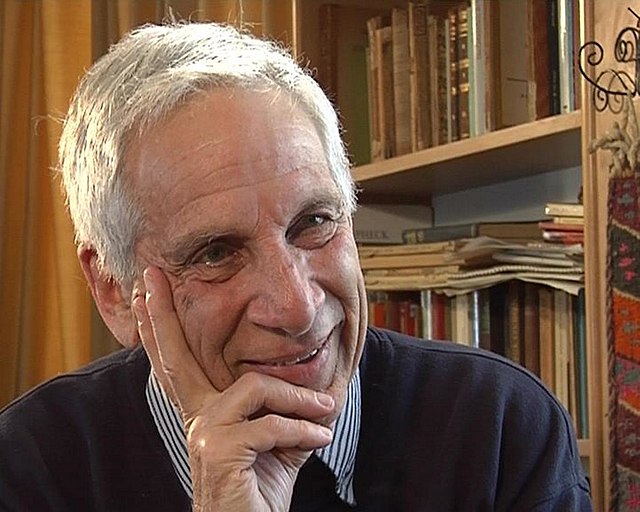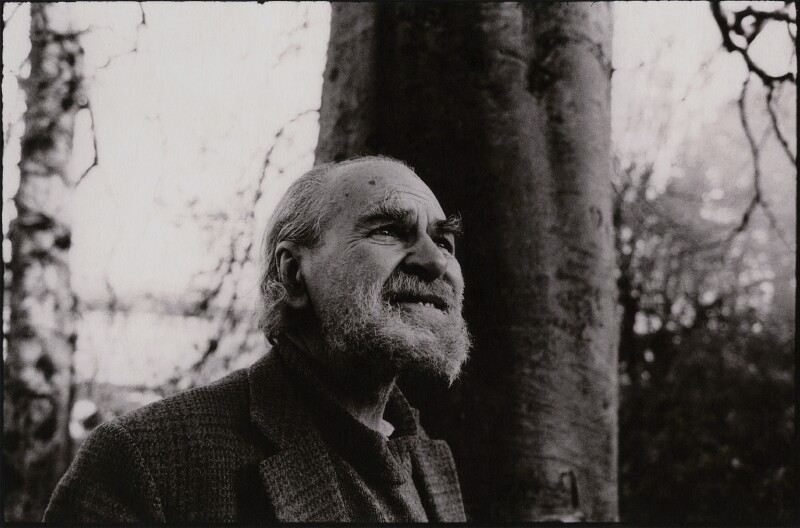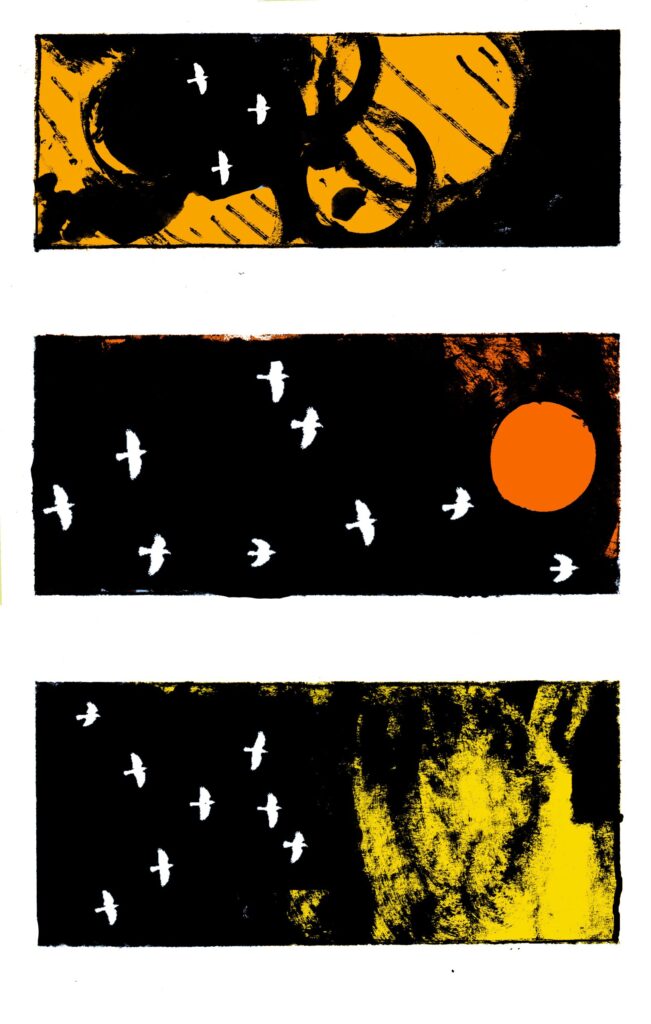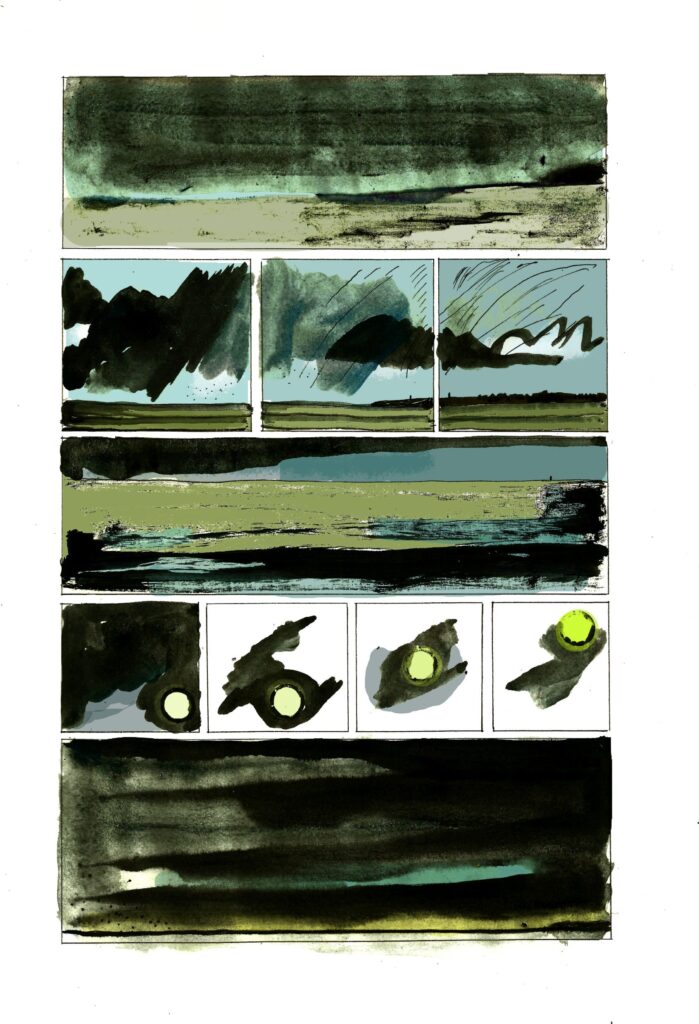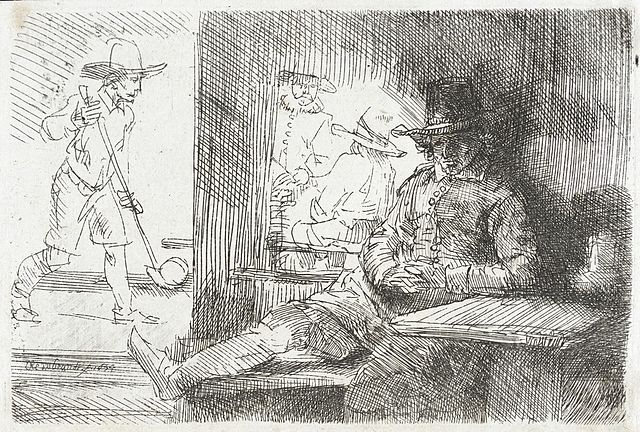
BRENDAN MCNAMEE finds uplift in athleticism
In The Hitchhiker’s Guide to the Galaxy Arthur Dent makes the startling discovery that white mice, rather than being the objects of experiments carried out by humans, were in fact carrying out an experiment on humans. I wonder if a similar principle might be applied to sport.
Take premiership football as an example. Passions run high. The passion, on the parts of both players and spectators, is primarily for victory. The players receive a huge ego (and cash) boost, and from the fans’ point of view, a win for their team is, by some mysterious process of osmosis, a win for themselves. This lust for victory is so intense that the other source of sporting joy, the quality of the game itself, is often relegated to a secondary position – acknowledged, of course, but seen essentially as a means to an end. This, I would contend, is topsy-turvy. The lust for victory should serve the game, and not the other way around – and this order of things reflects a wider truth about life itself.
“Eternity,” wrote William Blake, “is in love with the productions of time” (eternity here being understood as a state of timelessness, rather than an endless expanse of time). A game of football is a production of time, painstakingly worked out and evolved. But for what purpose?
Two teams are pitched in combat. Naturally, each wants to best the other. This ego-based desire is an intense drive, the need to control which necessitates strict rules which the participants, in their lust for conquest, forever strain against. But from the tension created by this drive and this straining (provided the leash is not broken) can come something that transcends the desires of individuals to achieve personal glory, and this something is what inspires that small and secret part of the sports fan which doesn’t really care who comes out on top. These are moments that justify sport, at its best, being called ‘poetry in motion’ – moments of sheer grace that stop the breath and remain forever etched in the memory, long after the identity of the victor has been forgotten.
These moments are the white mice in the equation, Blake’s glimpses of eternity. The participants imagine that they hone their skills and put in punishing hours of practice and follow rigidly prescribed dietary regimes in order to emerge victorious from the contest. They imagine that those sublime moments of grace (which come, if they come at all, only after such gruelling preparation) are simply a means to victory. And seen from their own personal points of view, they are. Their dreams, we may be sure, are of the glory and adulation that will follow victory. Avid young fans may be enthralled by the skills their heroes display, but they too dream of one day holding aloft the Cup at the end of the contest.
But there is one crucial difference between the dreams of glory that spur on a team and its fans, and those so memorable moments of grace. It is a difference that, I hope, justifies the use of such a lofty and ethereal term as ‘eternity’ in such a down-to-earth context.
The difference is this: the dreams of glory can be trained for, planned for, worked towards; the moments of grace are spontaneous eruptions, deaf and blind to the plans and schemes of ordinary mortals. To employ the mystical phraseology of Meister Eckhart, it is the difference between attachment and detachment. Eckhart establishes a link between attachment and temporality: “A man attached to things is stretched between a ‘before’ and an ‘after’, or between past and future. He lives in duration, while detachment dwells in ‘this present now.’ A detached man lives in the instant” (Schürmann).

A footballer lives mostly in duration, in the world of plans and projects. The scheme is: project, realise, possess: train for the game, play the game, win the game. If this plan is adhered to, all the way to the end, few tears will be shed if it is achieved without poetry.
But some will. Despite our saturation in the egoism of winning, there is still a quiet voice that longs for what Wallace Stevens calls in ‘The Blue Guitar,’ “a tune beyond us, yet ourselves.” For magic, in effect. We imagine that we invent these conflicts in order to win at them and so stroke our egos, but perhaps they are really invented to allow that magic into the world. Pragmatism is of course vital. In a football match, a player has to be fit and ready for the contest. Such readiness is no guarantee that a sublime moment of genius will emerge, but it more than likely won’t if he is not. And the ego is equally important. Both teams must desperately want to win, otherwise you end up with, at best, a high-class kickabout.
So why refer to these moments as detachment when they so clearly cannot be detached from the time-bound structures through which they come into being? Are they not serving the ultimate purpose of winning the match in the same way as all the other elements of the game such as training, tactics, effort, will, etc? True, they can end up serving it, but seen from the true sports lover’s point of view, this is merely accidental, a by-product. Winning in sport is one kind of joy that needs the corresponding sorrow of losing simply to exist. You can’t have winners without losers; they are two sides of the same coin. Heraclitus’s intriguing aphorism, “Gods and mortals, dying each other’s life, living each other’s death” (Yeats) can find some traction here. The conflict on one level, the time-bound level, is between two teams, but on another, the detached level, it is between gods and mortals. And this conflict is both necessary and creative because the two levels are inextricably intertwined. The gods need the mortals because it is only through media – the game – constructed by mortals that their magic can take form. When that magic occurs, there is a sense in which mortals, as time-bound ego-driven creatures, momentarily cease to exist. Mortals need the gods because without them, they would die of tedium. And indeed, it may be said that, when immersed in our time-bound ego-driven selves, the gods are dead. The gods within us are dead.
In today’s world this vital balance between soul and ego is in danger of collapse, and modern professional football provides a stark demonstration of this. A telling instance of this disruption can be seen in the changing perceptions of the Premiership versus the FA Cup. There was a time when the FA Cup Final was the sporting highlight of the year. Now, it is generally accepted that the Premiership is paramount. This is a significant shift. In the FA Cup, everything rode on one game. There were no second chances (I hear echoes of Robert De Niro’s character in The Deer Hunter with his rather mystic insistence that, in hunting deer, you get only “one shot”). Such an arrangement facilitates a level of concentration and will needed to bring out the best in players, and thus possibly bring about that eclipsing of time that extreme heights of tension can facilitate. In the Premiership, by contrast, a team could conceivably crawl through the season playing pretty dismal football, ‘parking the bus’ at every opportunity (as indeed, one recent Premiership manager was frequently accused of doing), and still come out on top. (For non-fans, ‘parking the bus’ means scoring a goal and immediately throwing everything back into defence, effectively putting up a wall in front of your own goal.)
Imagine a situation where, say, Chelsea and Manchester City reach the final game in the Premiership and Chelsea are one point ahead of City at the top of the table. On the final day, they are playing on different grounds. Being a point ahead, Chelsea can afford to lose their match, but only provided City also lose theirs. Let’s say they have an off-day and play a rubbish game, and lose. Naturally, the fans are devastated. But wait! News come through on their phones that City have also lost, thereby granting Chelsea the title. The fans immediately erupt in joy – having just watched their team play a rubbish game and lose. Are they football fans or accountants?

Accountancy appears also to be playing a part in the debate currently raging in the tennis world about who is the GOAT (Greatest Of All Time): Roger Federer, Raphael Nadal or Novak Djokovic. Nadal has streaked ahead in the numbers game with twenty-two Grand Slam titles, as opposed to a mere (mere?) twenty to Federer and twenty-one to Djokovic. Djokovic, being the youngest of the three, will no doubt catch up (Federer has just retired from professional tennis), but for the view of sport that I’m putting forward here, such numbers are irrelevant (although not to the players themselves, I’m sure). From that angle Federer is the clear winner in this contest, as anyone who has seen him in his glory days would surely agree. Even this writer, with only a spectator’s interest in actual sport (as opposed to philosophically musing about it), could sense something unearthly about his play. David Foster Wallace once wrote an essay called ‘Roger Federer as a Religious Experience.’ I doubt you’ll ever find essays like that being written about Nadal or Djokovic, well-oiled and highly efficient tennis machines that they are.
Mention of The Deer Hunter above calls to mind some other echoes of this idea in the field of the Hollywood movie. Robert Rossen’s 1962 film, The Hustler, features a pool shark called “Fast” Eddie Felson. At one point in the film he tries to explain to his girlfriend the true nature of his passion. It has nothing to do with the money, or with being seen to be the best. These are quantifiable objectives, un-transformable phenomena of the everyday world. What really inspires him, he says, are those rare moments when the pool cue seems to become an extension of his arm, when he can do no wrong, when everything – himself, the game, the world – simply become one, indivisible process, a living work of art.
Bringing religious terminology to the matter, there is the 1981 film about Olympic runners, Chariots of Fire. One of the athletes is a devout Christian who postpones a trip to the Far East, where he is to work as a missionary, in order to take part in the games. When his equally devout wife chides him for this selfish, unchristian attitude, he replies, “God made me fast, and when I run, I feel his pleasure”. Eternity opens a chink in the armour of time, and Blake’s “love” is made manifest. Or, to put it in more down-to-earth terms, skill and spontaneity join hands and, momentarily, dancer and dance are one.
But these are ‘mere’ fictional examples, you might say. (I put ‘mere’ in quotation marks to highlight an idea best expressed by Alan Watts and directly relevant to this essay: “There is no more telling symptom of the confusion of modern thought than the very suggestion that poetry or mythology can be ‘mere’”.) Do real athletes feel anything similar? Actually, if a googling of inspirational quotes from top athletes is any yardstick, they mostly don’t. A trawl of over a hundred such quotes threw up less than half a dozen that gave any hint at all of an awareness that something in sport might possibly be more valuable than winning. The vast bulk are on the theme of never giving up, striving, first is everything, second is nowhere, etc, etc. Even when they extol losing it’s only to harden you up for future successes. And I recall a televised interview with Andy Murray some years ago when he was asked if he enjoyed his tennis. After some hesitation, he replied: “I enjoy winning.” (I’ve since heard him say that he does enjoy his tennis but I suspect the PR people have got to him: “Never be negative, Andy! Never be negative!”)
But not all athletes share this acquisitive mania. The racing driver, Mario Andretti, has a comment that echoes to some extent the line from Chariots of Fire quoted above, though shorn of any religious connotations: “If you have everything under control, you’re not moving fast enough.” The tennis player, Arthur Ashe, is hovering around the heart of the matter with this comment: “You are never really playing an opponent. You are playing yourself, your own highest standards, and when you reach your limits, that is real joy.” And the American gymnast, Mary Lou Retton, has gifted us this pithy comment: “A trophy carries dust. Memories last forever.” (Incidentally, the fact that such remarks are so rare only bolsters my argument that this way of looking at sport is sadly, and increasingly, undervalued.)
It’s intriguing, I think, that the quote approaching closest to a sense of the mystic heart of sport should come from a gymnast. Gymnastics shares with my two fictional examples of pool and running the distinction of being one of the rare sports that one effectively plays alone. There are competitions, of course, but that horizontal element of the game is thoroughly earthbound – egos competing with one another (as Arthur Ashe recognises). The other, vertical, element is where the player’s mind, the player’s body and the sport itself come together like three notes forming a chord. It’s as if the gods had a committee meeting one day and said, “This rough-and-tumble of contact sports allows the ego too much dominance. Our voices are rarely heard. We need to finesse the idea.” And so they came up with pool and running and gymnastics – all sports requiring deep levels of silence, deep enough for, now and then, the music of the spheres to be heard. And, in a moment of true inspiration, they also came up with golf.
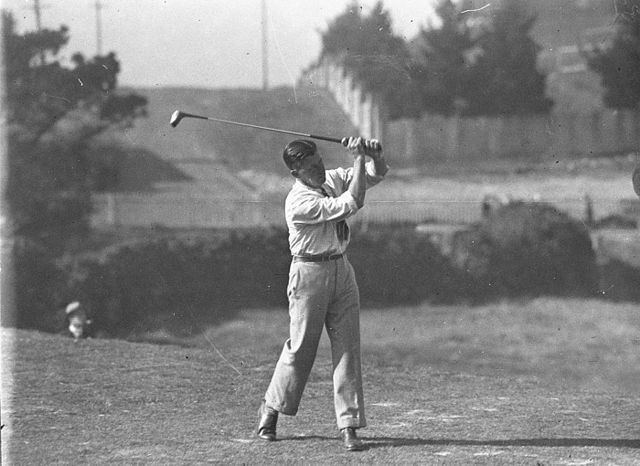
Golf! do I hear you say? That symbol of suburban complacency and silly jumpers? But that’s to see it only from the outside. In a wonderful essay on golf, ‘Tips on a Trip,’ John Updike, having run through and dismissed all the secondary definitions and purposes of golf – a hobby, a profession, a pleasure, a walk in the country – finally reveals it to be “a trip”:
A non-chemical hallucinogen, golf breaks the human body into components so strangely elongated and so tenuously linked, yet with anxious little bunches of hyper-consciousness and undue effort bulging here and there, along with rotating blind patches and a sort of cartilaginous euphoria – golf so transforms one’s somatic sense, in short, that truth itself seems about to break through the exacerbated and as it were debunked fabric of mundane reality.
That final phrase – “truth itself seems about to break through the exacerbated and as it were debunked fabric of mundane reality” – catches the essence of what I’m calling here the mystic heart of sport. And it’s by no means confined to professionals.
Updike tells two intriguing golf stories in his essay. The first is of how he went to a professional coach one time in order to improve his play. The coach gave him some simple advice about the placing of his feet. “That’s all?” Updike asks. “That’s all,” the coach says. Sceptical, but determined to try it out, Updike follows the coach’s instruction – and finds that his game improves immensely. But here’s the intriguing part: he feels thoroughly dissatisfied. The game seems now to be confined to his feet and it’s as if the rest of his body has been anaesthetised: “I couldn’t internalise it . . . All richness had fled the game”. And so he returns to his old losing ways, but feels better for it. I would have found this story baffling had it not reminded me of a poker player I once knew who told me that he could spend a night playing poker and come out with a loss, but still feel better than on many another night when he’d emerge a winner. The result is not the point. The point is what happens within.
Updike’s second story is of how he once accidentally hit a perfect shot. He goes on to explain: “In this mystical experience, some deep golf revelation was doubtless offered me, but I have never been able to grasp it, or to duplicate the shot”. And that’s the point: such magical moments cannot be replicated. They cannot be quantified and put into manuals. They happen. They are gifts, moments when “the tyranny of causality is suspended, and men are free”. “If I knew where poems come from” the Irish poet Michael Longley once said, “I’d go there.” Sports people must often feel much the same.
The scientifically-minded might be inclined to dismiss any such airy talk of mystical experience by pointing to the correlations of such phenomena with various activities going on within the brain. It’s all got to do with jumping neurons and synapses, they’ll say. But this kind of “nothing buttery,” as the philosopher Mary Midgely calls it, in which we declare emergent realities to be “nothing but” the things in which we perceive them (a painting is “nothing but” smears of pigment on a canvas; music is “nothing but” differently pitched vibrations in the air), can be just as easily turned on its head so that instead of saying, “nothing but,” we can say, “not only but also.” A painting is not only smears of pigment on a canvas, but also a deeply enriching and mysterious experience. The experience may correlate with certain neural activities which can be quantified, but that fact alone does nothing to give you any sense of the experience itself.
This “dipsomania for the factual,” as Robert Musil calls it, echoes the conflict being discussed in this essay. You can’t blame science, of course, for devoting itself to the factual – that’s its job – but scientism, the conviction that only the factual can give us any real truth, is the malignant growth of a useful tool into a dogma. When it comes to permeate society, as it does today, something valuable is lost. In sport, this loss is disguised by the fact that such overwhelming concentration on winning – fuelled by ego and greed, both quantifiable entities – improve sporting standards immeasurably, but what becomes ever rarer in this over-heated atmosphere is the “eerie effortlessness of a good shot” (Updike), to put it at its simplest. Roger Federer making top class opponents appear lead-footed, David Gower hitting a boundary with the careless grace of a man brushing off a fly, George Best weaving through five defenders as if he was bodiless – there’s a hint of immortality in such moments. “There is a certain part of all of us that lives outside of time,” Milan Kundera’s narrator says in his novel, Immortality (4), when he is startled by the sight of a timeless girlish gesture emerging from the body of a timeworn elderly woman. It is that part, I believe, that is reflected back to us in moments of sporting genius, and sounds a deep resonant bell within.
Robert Musil tried to knit together these two elements of the phenomenon – the ethereal and the down-to-earth, the mystical and the scientific. Ulrich, the hero of The Man Without Qualities, gets set upon by three thugs in the street one night. As an ex-solder himself, he responds vigorously, but they get the better of him in the end. As he picks himself up, he is rescued by a woman in a passing coach, to whom he proceeds to expound upon the experience in his usual forensic fashion.
Of course he now launched into a lively defence of his experience, which was not, as he explained to the motherly beauty, to be judged solely by its outcome. The fascination of such a fight, he said, was the rare chance it offered in civilian life to perform so many varied, vigorous, yet precisely coordinated movements in response to barely perceptible signals at a speed that made conscious control quite impossible. Which is why, as every athlete knows, training must stop several days before a contest, for no other reason than that the muscles and nerves must be given time to work out the final coordination among themselves, leaving the will, purpose and consciousness out of it and without any say in the matter. . . If by some unlucky chance the merest ray of reflection hits this darkness, the whole effort is invariably doomed.
So far, so rational, you might say, and nothing there that any sports psychologist would find fault with. They call it being ‘in the zone.’ But Ulrich, as much a mystic as he is a scientist, goes on:
Basically, he now maintained, this experience of almost total ecstasy or transcendence of the conscious mind is akin to experiences now lost but known in the past to the mystics of all religions, which makes it a kind of contemporary substitution for an eternal human need. Even if it is not a very good substitute it is better than nothing, and boxing or similar kinds of sport that organise this principle into a rational system are therefore a species of theology. . .
Broadening the idea out to include spectators as well as participants, it may be no accident that the words ‘happen’ and ‘happy’ have the same root: ‘hap’. A great sporting event is a happening, an event, because of its anticipated elements of spontaneity, its vibrant potentiality, the anticipated, longed-for lifting of the soul out of the mundane treadmill of linear time. For many, these are moments of the greatest, most intense happiness, when life is lived – if only by proxy – on the edge. It’s why people climb mountains and skydive. But the exhilaration that follows success comes at the price of risking the hollow emptiness of defeat, and winners and losers alike might do well to heed Ulrich’s words in the passage quoted above: the experience is “not to be judged solely by its outcome.” The Yorkshire writer John Braine once compared success to strawberries: enjoy them while they’re in season, he said, but don’t imagine you can live on them (trophies carry dust).
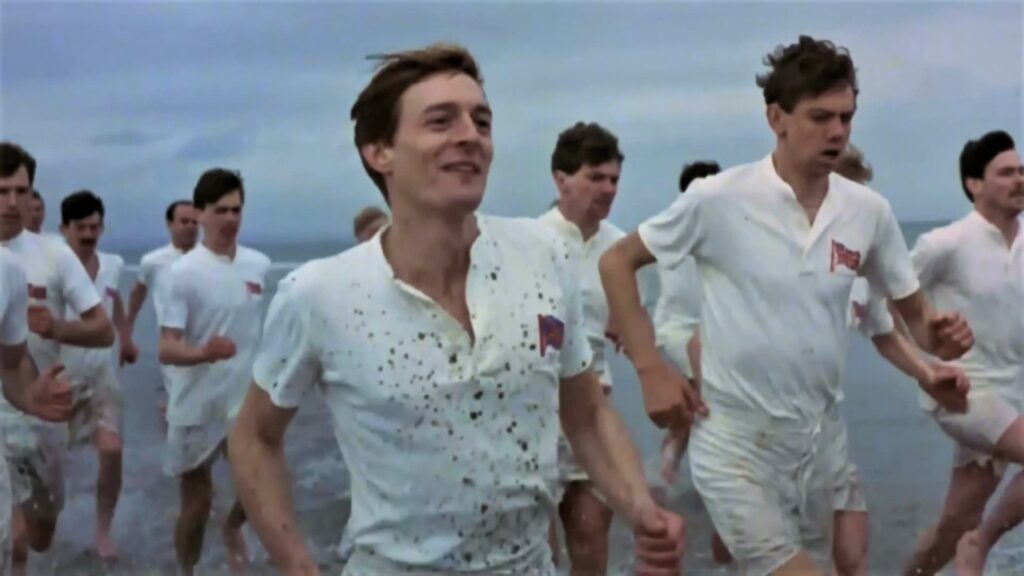
What you can live on (what all sports fans live on, in fact) is the anticipation of success, the hope. Whether it’s anticipation of the outcome of a single game or a broader anticipation stretching over a whole season (and containing a host of smaller anticipations along the way), that tension is like a taut string creating a music all its own. But unless you’re some kind of Zen master, the problem is that you can’t really separate wanting to win from actually winning. Or losing. The pleasure of all that anticipation hinges on the actual outcome, though the outcome is really not the point; the real point (from the gods’ point of view) is the anticipation itself, the tension, the thrill of following all those “varied, vigorous and precisely coordinated movements in response to barely perceptible signals.” The gods don’t care a whit about us as individuals. We’re expendable, mere channels for what Yeats called “the passions,” and sports are what he called “forms created by passion to unite us to ourselves”. It’s an irresolvable paradox (except perhaps in fiction): in order for the passions to reach their height, the carriers of the passion have to remain unaware of their true source, and be conned into believing that the momentary egoistic thrill of winning is what it’s really all about.
Richard Attenborough, playing the commander who organises the mass break-out in The Great Escape, intuits a similar truth at the end of the film, after being captured by the Germans. Talking to his friend (minutes before they are both machined-gunned to death), and not sounding at all downbeat about the capture, he says, “D’you know, Andy, all this, Tom, Dick, Harry [the three tunnels they’d spent months secretly digging], it’s kept me alive.” He realises that getting re-captured (and hence failing to win the match, as it were) matters less than the steady throb of hope and anticipation that filled up all the time leading to the escape. And if the escape had been successful, or if the Germans had not been so unsporting as to kill him, and he’d lived to tell the story to his grandchildren, it would surely be the planning, the tactics, the secrecy, the tension of the escape preparations that would fill his memory, rather than the fact the attempt itself resulted in either success or failure, those “two imposters,” as Rudyard Kipling has famously called them.
Hermann Broch’s complex modernist novel, The Death of Virgil, dealing with a poet from two thousand years ago, is about as far from modern sport as you could hope to get. Yet Virgil’s central dilemma echoes the tension I’ve been speaking of here between the timebound (quantifiable results) and the eternal (spontaneous happenings, potentiality), or between the professional and the inspired amateur.
On the eve of his death, Virgil wants to burn his greatest work, The Aeneid, because he believes he has betrayed the essence of his gift, which was not so much the actual manuscript of the work as the dynamic creativity that brought it into being. He calls the actual work, an artefact that belongs to the world of time, “un-art”: “Oh, in his own life, in his own work, he had known the seduction of un-art, the seduction of all substitution which put the thing created in the place of that which creates, the game in the place of communion, the fixed thing in the place of the ever-vital principle, beauty in the place of truth” (italics added).
Virgil’s “un-art” is the statistics-obsessed nature of modern professional sport where winning is all, and this attitude is, I would contend, a betrayal of the soul of sport, even though, paradoxically, that very betrayal is largely responsible for the incredibly high standard that much modern sport exhibits. But the high standards themselves can be something of a red herring, from the participants’ point of view, if not the spectators. Spontaneity is too unpredictable and there is too much money at stake. A certain minimum standard is, of course, necessary, but magic was as likely to appear on a mud-caked football field of the seventies, when players happily juxtaposed professional games with copious amounts of beer and burgers, as on today’s pristine green carpets, when they are all slaves to strict dietary regimes. George Best was no ascetic! And to return for a moment to the tennis world, any future contenders for the number of Grand Slams won by Nadal and Djokovic will have to follow similarly rigid training and finely-tuned technical regimes, most likely at the cost of any natural spontaneity that they may have had to begin with. Future Federers will have no hope of competing, though I’m guessing that they would be the spectators’ favourites.
Echoes of this inner conflict can be found even beyond the confines of sport and art. If we call the necessary treadmill of linear time ‘order’ (in sport, tactics, set pieces, rigid team formations etc) and sublime moments of rapture ‘chaos’ (sport’s unpredictable ‘poetry in motion’), then the essential creative tension between the two might be summed up in an elegant formula: order minus chaos equals death; chaos minus order equals madness. Imagine a high-stakes football match with no rules! And if Virgil had got his way about burning The Aeneid, no echo of that creative genius would ever inspire another soul. The physicist David Bohm put the idea like this: “If you had absolute creativity – absolute novelty with no past – then nothing would ever exist because it would all vanish at the very moment of creation” (Weber). Modern science sees this creative tension, or something vaguely similar to it, as constituting the very source of the universe’s existence. Richard Holloway provides a succinct encapsulation of the idea:
It is the precise balance of two great forces that creates the right conditions for life to exist. The expansive force of the Big Bang spreads the universe out, while the contractive force of gravity pulls it back together. If the gravitational force [order] were too high, the universe would appear, but in a microsecond gravity would pull everything back into a Big Crunch. If the expansion rate were too high [chaos], then the universe would stretch at such a rate that gravity would be unable to form the stars and galaxies from whose dust carbon-based life evolved. [. . .] These delicate adjustments do not only refer to the earliest instance, but to the continuing history of the world and its detailed processes.
One of those detailed processes is the phenomenon of sport.
The philosopher E.M. Cioran has written, “History divides itself in two: a former time when people felt pulled towards the vibrant nothingness of divinity and now, when the nothingness of the world is empty of divine spirit”. It may be that in our ultra-secular, numbers-obsessed Western world, whose oppressive nothingness the advertisers keep us distracted from, sport occasionally affords one opportunity to touch, or to witness, the sublime heights that were once the province of religion. But it appears to be a losing battle. The white mice may have to think up another concept.
References
Blake, William. Complete Writings. Ed. Geoffrey Keynes. Oxford: OUP, 1966.
Broch, Hermann. The Death of Virgil. Trans. Jean Starr Untermeyer. 1945. Oxford: Oxford University Press, 1983.
Cioran, E. M. Tears and Saints. Trans. Ilinca Zarifopol-Johnston. Chicago: University of Chicago Press, 1995.
Holloway, Richard. Looking in the Distance: The Human Search for Meaning. Edinburgh: Canongate, 2004.
Hudson, Hugh. Chariots of Fire. Screenplay by Colin Welland. 20th Century Fox, 2004.
Kundera, Milan. Immortality. London: Faber and Faber, 1991.
Musil, Robert. The Man Without Qualities. Trans. Sophie Wilkins. London: Picador, 1997.
Schürmann, Reiner. Wandering Joy: Meister Eckhart’s Mystical Philosophy. Great Barrington, MA: Lindisfarne Books, 2001.
Stevens, Wallace. Selected Poems. London: Faber and Faber, 1953.
Sturges, John. The Great Escape. Screenplay by James Clavell and W. R. Burnett. The Mirisch Company, 1963.
Updike, John. Picked Up Pieces. 1977. New York: Ballantine Books, 1986.
Watts, Alan. Myth and Ritual in Christianity. 1954. London: Thames and Hudson, 1981.
Weber, Renee. Dialogues With Scientists and Sages: The Search for Unity. London: Routledge & Kegan Paul, 1986.
Yeats, W. B. A Vision. 1937. Rev. ed. 1962. London: Macmillan, 1962.
BRENDAN MCNAMEE is the author of books and articles on John Banville, Michel Houellebecq, Gerald Murnane, Robert Musil, Sean O’Casey, Flannery O’Connor, W B Yeats and others

